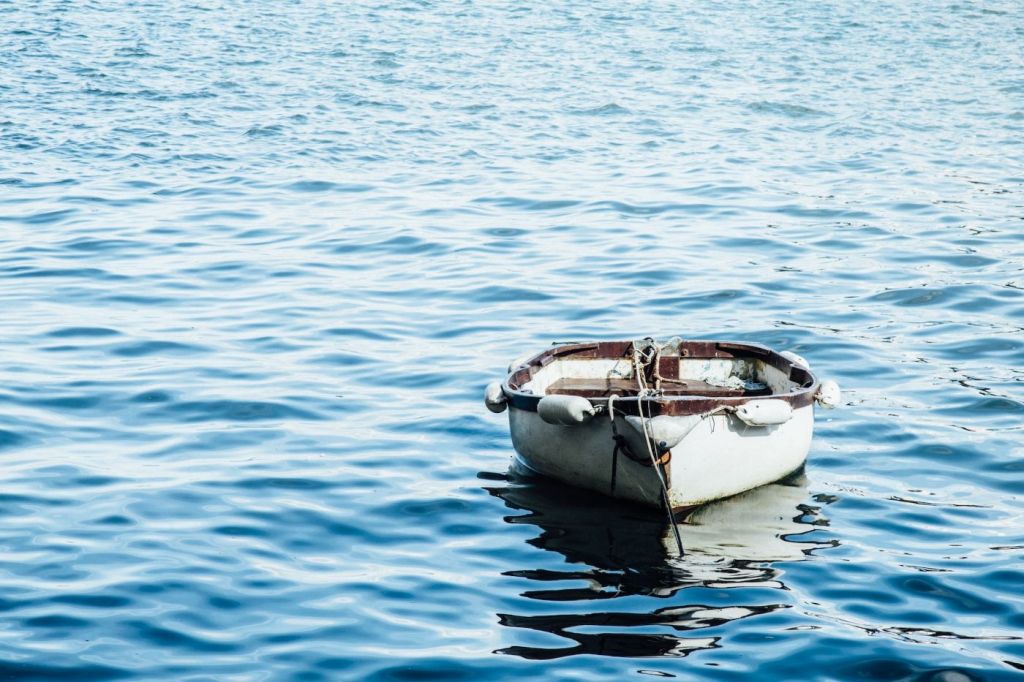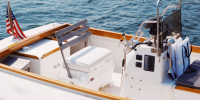Do You Have To Register a Boat With a Trolling Motor? (Per State)
Boat registration is a legal requirement that helps to ensure the safety of boaters and the protection of the environment. While some states exempt non-motorized boats such as canoes, kayaks, and inflatable boats from registration, attaching a trolling motor is a different case. In this article, we'll talk about whether you need to register a boat with a trolling motor or not.
In general, a boat with a trolling motor counts as a motorized vessel. Whether you have a kayak, canoe, or inflatable boat that normally doesn't require registration, as soon as you add a trolling motor, it will be considered a motorized boat that needs to be registered.
In Alabama, you must register your boat with a trolling motor if it has a motor with 10 horsepower or more, regardless of the length of the boat. Let's look at other state-specific regulations when it comes to registering a boat with a trolling motor.
Summary
- In South Carolina, a boat that is powered by a motor with a horsepower rating of 5 or greater must be registered with the state, regardless of whether it is a trolling motor or a larger motor.
- In Missouri, any motorized watercraft, including boats with trolling motors, must be registered if they are used on public waters.
- Boats with electric trolling motors in Indiana are not required to be registered as long as they are not equipped with an outboard motor or any other type of propulsion motor.
- Any boat with a trolling motor that has a power output of more than 10 horsepower will need to be registered in Massachusetts.
- Boats with a trolling motor that is 10 horsepower or greater are considered to have a greater impact on the environment and require more regulation and oversight.

Registering A Boat With Trolling Motor
While non-motorized boats such as canoes, kayaks, or inflatable boats, can be exempted from boat registration, adding a trolling motor can change that. Below are the following states where registering a boat with a trolling motor is required:
| State | Estimated registration fee | Agency to register with |
|---|---|---|
| Alabama | $15 - $30 | Alabama Department of Conservation and Natural Resources (ADCNR) |
| South Carolina | $10 - $20 | South Carolina Department of Natural Resources |
| New York | $18 - $100 | New York State Department of Motor Vehicles |
| Texas | $32 - $150 | Texas Parks and Wildlife Department |
| California | $20 - $30 | California Department of Motor Vehicles (DMV) |
| Missouri | $15 - $25 | Missouri Department of Revenue |
| Florida | $18 - $152 | Florida Fish and Wildlife Conservation Commission |
| West Virginia | $15 - $100 | West Virginia Division of Natural Resources |
| Colorado | $25 - $50 | Colorado Parks and Wildlife (CPW) |
| Georgia | $15 - $25 | Georgia Department of Natural Resources (DNR) |
| Indiana | $15 - $30 | Indiana Bureau of Motor Vehicles |
| Kentucky | $15 - $25 | Kentucky Department of Fish and Wildlife Resources |
| Michigan | $15 - $23 | Michigan Department of Natural Resources |
| Massachusetts | $44 - $150 | Massachusetts Environmental Police |
| New Jersey | $12 - $60 | New Jersey Motor Vehicle Commission |
| Oklahoma | $25 - $42 | Oklahoma Tax Commission |
| Tennessee | $13 - $152 | Tennessee Wildlife Resources Agency |
| Utah | $18 - $30 | Utah Division of Parks and Recreation |
| Vermont | $23 - $49 | Vermont Department of Motor Vehicles |
| Wisconsin | $20 - $50 | Wisconsin Department of Natural Resources |
Registering a boat with trolling motor in Alabama
In Alabama, all boats with trolling motors are required to be registered with the state. The registration requirement applies to all boats with an electric trolling motor, gasoline-powered motor, or any other type of motor.
Any boat that is powered by a motor with a horsepower rating of 10 or greater must be registered with the state, regardless of whether it is a trolling motor or a larger motor.
However, if your trolling motor is less than 10 horsepower and your boat is less than 16 feet in length, you may be exempt from registration. The registration fee for a boat with a trolling motor in Alabama is $15 for a one-year registration or $30 for a two-year registration.
Registering a boat with trolling motor in South Carolina
In South Carolina, all motorized boats, including those with trolling motors, are required to be registered with the state. This includes electric trolling motors, gasoline-powered motors, or any other type of motor.
The registration requirement applies to boats that are used on public waters, including lakes, rivers, and coastal waters.
- If you are a resident of South Carolina, your boat must be registered with the South Carolina Department of Natural Resources (SCDNR).
- If you are a non-resident and your boat has been used in South Carolina for more than 60 days, you must also register your boat with the SCDNR.
Any boat that is powered by a motor with a horsepower rating of 5 or greater must be registered with the state, regardless of whether it is a trolling motor or a larger motor. However, if your trolling motor is less than 5 horsepower and your boat is less than 16 feet in length, you may be exempt from registration.
Registering a boat with trolling motor in New York
In New York, all boats with a motor, including those with trolling motors, must be registered with the state including electric trolling motors, gasoline-powered motors, or any other type of motor.
If you are a resident of New York, your boat must be registered with the New York State Department of Motor Vehicles (DMV). If you are a non-resident and your boat has been used in New York for more than 90 days, you must also register your boat with the DMV.
A boat that is powered by a motor with a horsepower rating of more than 10 horsepower must be registered with the state. If it is less than 10 horsepower and your boat is less than 18 feet in length, you may be exempt from registration.
Registering a boat with trolling motor in Texas
In Texas, all boats with a motor, including those with trolling motors, must be registered with the state, and this applies to all boats that are used on Texas public waters, including lakes, rivers, and coastal waters.
Any boat in Texas that is powered by a motor with a horsepower rating of more than 2 horsepower must be registered with the state. If your trolling motor is less than 2 horsepower and your boat is less than 14 feet in length, you may be exempt from registration.
Registering a boat with trolling motor in California
In California, you are required to register your boat with a trolling motor if it has a motor of any kind, including a trolling motor. According to the California Department of Motor Vehicles (DMV), any boat that is propelled by a motor, including electric trolling motors, must be registered with the state.
The size of the trolling motor does not matter. If your boat has a trolling motor, it must be registered with the DMV, regardless of the horsepower of the motor.
Registering a boat with trolling motor in Missouri
According to the Missouri Department of Revenue, any motorized watercraft, including boats with trolling motors, must be registered if they are used on public waters. The trolling motor size does not matter, as long as it is capable of propelling the boat.
Therefore, if you have a boat with a trolling motor that you plan to use on public waters in Missouri, you will need to register it with the state.
Registering a boat with trolling motor in Florida
In Florida, any motorized boat with a trolling motor must be registered with the Florida Fish and Wildlife Conservation Commission (FWC) if it is operated on public waters. This includes boats with electric trolling motors, gas-powered motors, or any other type of motorized propulsion.
The size of the trolling motor does not matter, as long as it is capable of propelling the boat. Any boat with a motor, regardless of the horsepower, must be registered if it is used on public waters in Florida and you may need to pay a fee between $18 - $152.
If you're interested in owning a boat in Florida, there are other fees that you should be prepared for such as the ones highlighted in this article.
Registering a boat with trolling motor in West Virginia
In West Virginia, you are required to register your boat with a trolling motor if it is powered by any type of motor, including an electric trolling motor. They must display the registration number and validation decal on the hull of the boat in accordance with West Virginia boating laws.
The registration fee for boats with a trolling motor varies depending on the length of the boat, ranging from $15 for boats less than 16 feet to $100 for boats 40 feet or longer.
All boats with a trolling motor must comply with West Virginia boating laws and safety regulations, including carrying the required safety equipment, having the appropriate number of life jackets on board, and following all boating rules and regulations.
Registering a boat with trolling motor in Colorado
In Colorado, all motorized boats, including those with trolling motors, must be registered with the state. This includes electric trolling motors, gasoline-powered motors, or any other type of motor.
Any boat that is powered by a motor with a horsepower rating of more than 10 horsepower must be registered with the state, regardless of whether it is a trolling motor or a larger motor. However, if your trolling motor is less than 10 horsepower and your boat is less than 16 feet in length, you may be exempt from registration.
Registering a boat with trolling motor in Georgia
In Georgia, all motorized watercraft, including boats with trolling motors, must be registered with the Georgia Department of Natural Resources (DNR).
Georgia law requires that boats with motors exceeding 10 horsepower (7.5 kW) must be registered and titled. However, boats with motors less than 10 horsepower (7.5 kW) are not required to be registered or titled.
Note that even if your boat is not required to be registered, it must still comply with all safety regulations and requirements, including carrying the appropriate safety equipment, following speed limits, and obeying all other boating laws.
Registering a boat with trolling motor in Indiana
Boats with electric trolling motors in Indiana are not required to be registered with the Indiana Bureau of Motor Vehicles (BMV), as long as they are not equipped with an outboard motor or any other type of propulsion motor.
According to Indiana law, a boat is considered to be "motorized" and requires registration if it is propelled by a motor, engine, or electric motor. Electric trolling motors are not considered to be propulsion motors, as they are designed to assist in maneuvering the boat rather than to propel it through the water.
Don't know how to pick the right size of outboard motor for your sailboat? Here's how to calculate.
Registering a boat with trolling motor in Kentucky
In Kentucky, boats with trolling motors are required to be registered if they are used on public waters. According to the Kentucky Department of Fish and Wildlife Resources, all motorized watercraft, including boats with trolling motors, must be registered with the state.
The requirement to register a boat with a trolling motor in Kentucky applies regardless of the size or horsepower of the motor. Once your boat is registered, you must display the registration number and decal on the boat as instructed by the Kentucky Department of Fish and Wildlife Resources.
Registering a boat with trolling motor in Michigan
Whether your boat has a trolling motor with low or high horsepower, you will still need to register it in the state of Michigan. The registration fee for boats with trolling motors in Michigan is primarily based on the length of the vessel.
For example, as of 2021, the registration fee for a boat with a trolling motor that is less than 12 feet long is $15, while the fee for a boat that is between 12 and 16 feet long is $23.
In addition to the basic registration fee, there may be additional fees for things like a watercraft use tax or a boating safety fee. The watercraft use tax is a one-time fee that is based on the purchase price of the boat, while the boating safety fee is an annual fee that helps fund boating safety programs in the state.
Registering a boat with trolling motor in Massachusetts
Any boat with a trolling motor that has a power output of more than 10 horsepower will need to be registered in Massachusetts. However, if your trolling motor has a power output of less than 10 horsepower, you will not need to register your boat with the state.
The registration process involves filling out an application form, providing proof of ownership, and paying a registration fee of $44 for boats less than 16 feet in length and a fee of $132 for boats 40 feet or longer.
Registering a boat with trolling motor in New Jersey
In New Jersey, all boats with motors, including those with trolling motors, must be registered with the New Jersey Motor Vehicle Commission (MVC). This means that if your boat has a trolling motor attached to it, you must register it with the MVC, regardless of the size or power of the trolling motor.
However, if your trolling motor is detachable and you only use it occasionally, you may not need to register your boat with the trolling motor. It is best to check with the MVC to determine if your boat with a trolling motor requires registration.
Registering a boat with trolling motor in Oklahoma
In Oklahoma, all boats with a motor or trolling motor must be registered with the Oklahoma Tax Commission. This includes boats with electric trolling motors.
Oklahoma requires boats with a motor or trolling motor that is 10 horsepower or greater to be registered. However, boats with a trolling motor that is less than 10 horsepower may not require registration. This is because boats with a motor or trolling motor that is 10 horsepower or greater are considered to have a greater impact on the environment and require more regulation and oversight.
Registering a boat with trolling motor in Tennessee
In Tennessee, boats with trolling motors are required to be registered if they are operated on public waterways. This ensures that all boats on the water are properly identified and accounted for and that they meet certain safety standards.
Tennessee requires boats with a motor or trolling motor that is 8.5 horsepower or greater to be registered. However, boats with a trolling motor that is less than 8.5 horsepower may not require registration.
Registering a boat with trolling motor in Utah
In Utah, all motorized watercraft, including boats with trolling motors, must be registered with the state. This includes boats with electric trolling motors that are used for fishing or other recreational activities.
Any boat that is powered by a motor, regardless of its size, must be registered with the state of Utah. This requirement is to ensure that all boats on Utah's waterways are properly identified and accounted for and to help promote safe and responsible boating practices.
Registering a boat with trolling motor in Vermont
In Vermont, all motorized watercraft, including boats with trolling motors, must be registered with the state, including boats with electric trolling motors that are used for fishing or other recreational activities.
However, boats that are propelled solely by oars or paddles, such as canoes, kayaks, and rowboats, are not required to be registered with the state. This is because they do not have any type of motor or propulsion system that requires registration.
Additionally, sailboats that are less than 12 feet in length and are not equipped with any type of motor are also exempt from registration in Vermont. However, sailboats that are 12 feet or longer and have a motor, including a trolling motor, must be registered with the state.
As for horsepower, Vermont requires boats with motors of 10 horsepower or greater to be titled and registered with the state.
Registering a boat with trolling motor in Wisconsin
In Wisconsin, all motorized watercraft, including boats with trolling motors, must be registered with the state. There is no minimum or maximum horsepower requirement for boat registration in Wisconsin. All motorized boats must display a registration decal and carry a registration card on board while operating on Wisconsin waters.
Wisconsin also requires boaters to complete a boating safety course if they were born on or after January 1, 1989, and are operating a motorized boat on Wisconsin waters. Additionally, certain boating safety equipment, such as life jackets, fire extinguishers, and distress signals, are required to be on board all boats operating on Wisconsin waters.
Curious as to how to register your boat? You can read this article for more information.
Did you find the answer to your specific question?
👍 1 👎 2




Leave a comment